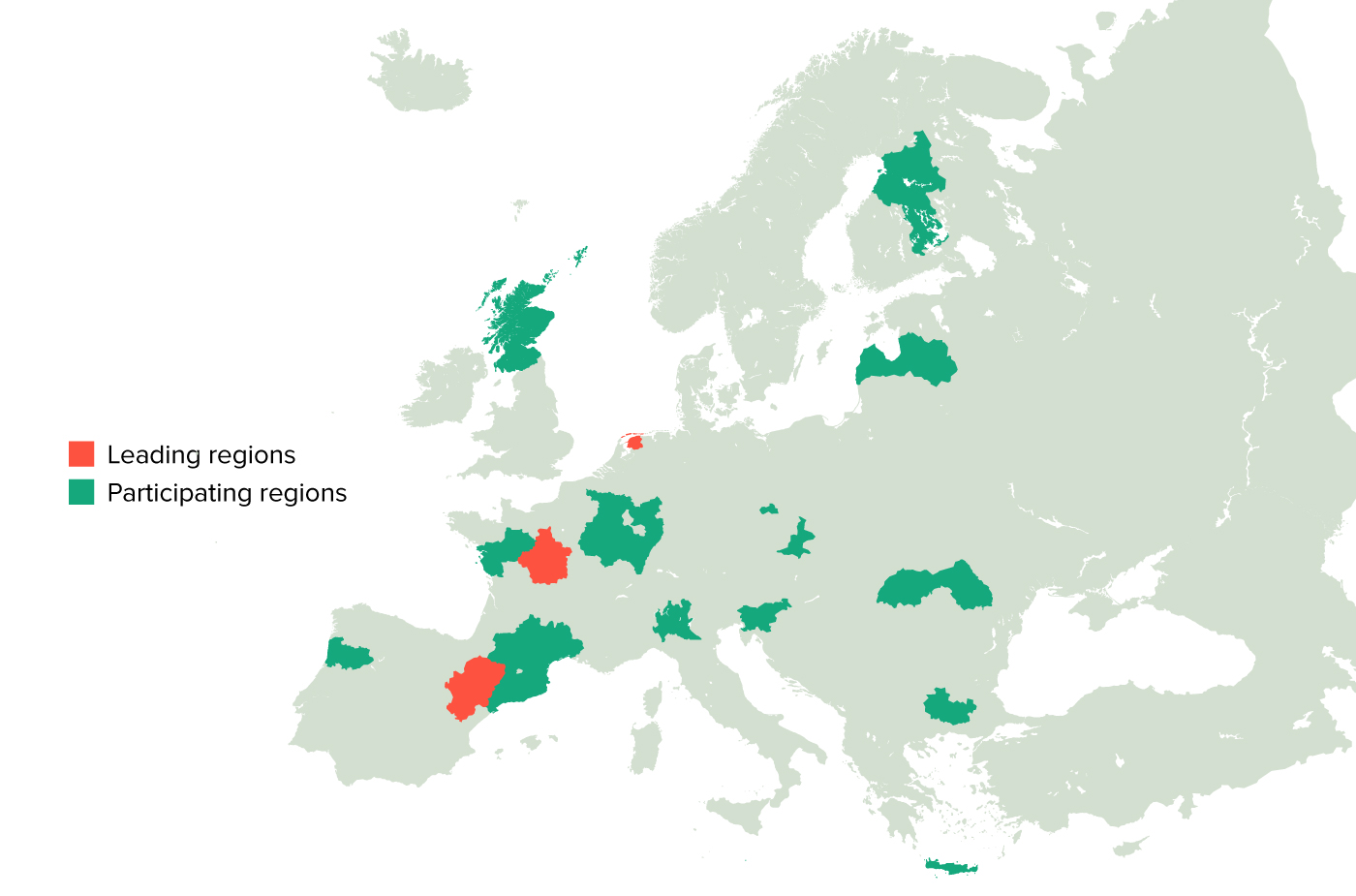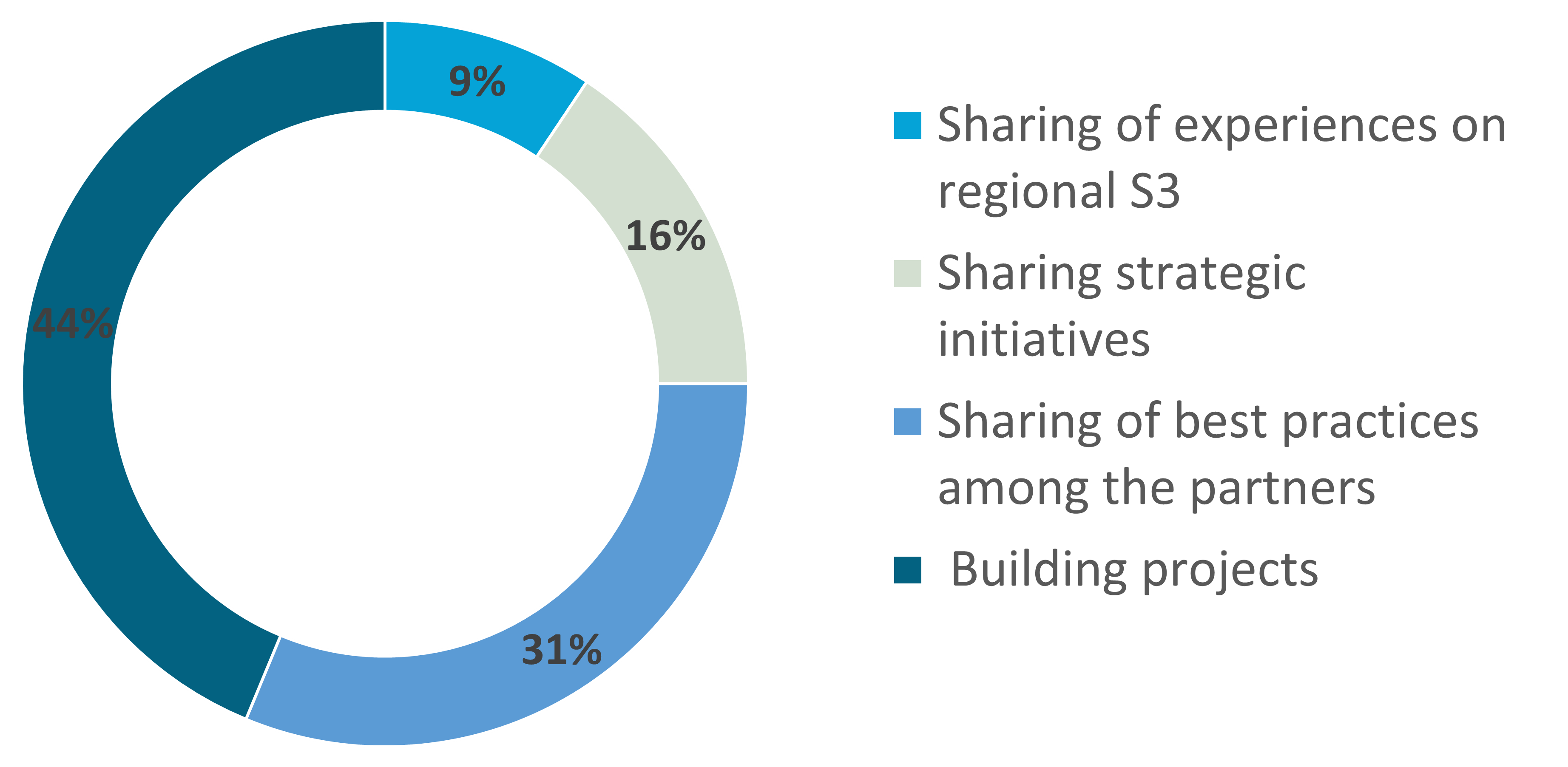Water Smart Territories
Context
Sustainable water management is essential for European key sectors such as tourism, agriculture, energy, but also chemical, paper and food industry. European society and economy in different territories must tackle the following trends that will determine the competitiveness of European water industry:
- Boosting resilient infrastructure: Aging infrastructure and low investment in operation and maintenance; persistent and emerging pollutants, water losses and scarce resources;
- Digitalization: Business intelligence, acquisition and management of big data, sensors, robotics, virtual reality are new elements that might facilitate water management for different water users and uses;
- Circular economy: resource recovery, sludge valorisation, water reuse, energy efficiency;
- Enabling multistakeholder governance: water should be managed according to the multiple water users: agriculture, urban and industrial water consumers .The WST partnership was created in this context.
Year established: 2019
Regions (lead and partner)
- Leading regions: Aragon (ES), Centre-Val de Loire (FR), Friesland Province (NL)
- Participating regions: Catalonia (ES), Crete (EL), Grand Est (FR), Kainuu (FI), Latvia (LV), Liberec region (CZ), Lombardy (IT), Malta (MT), Norte (PT), North East Romania, (RO), North West Romania (RO), Northern Ostrobothnia (Pohjois-Pohjanmaa; Oulu subregion (city of Oulu)) (FI), Northern Savonia (Pohjois-Savo) (FI), Occitanie (FR), Olomouc (CZ), Pays de la Loire (FR), Rhineland-Palatinate (DE), Scotland (UK), Slovenia (SI), South Central area (BG), South Moravia (CZ), South Savo (FI), Wallonie (BE)

Mission
The mission of the Water smart Territories (WST) partnership is to strengthen innovation capacity of European regions beyond resource efficiency, in order to facilitate new investments based on open innovation infrastructure and new technologies for sustainable water management by clusters in regional ecosystems. A closer and interdisciplinary collaboration by partner regions and regional cluster organisations will respond to the water industry challenges through advanced technological solutions to tackle European water territories and society needs. WST has developed a project idea with three main dimensions:
- Engagement and connecting existing innovation platforms, testbeds and services (capitalise and support new investment;
- Support SMEs implement and finance pilot and demonstrator projects;
- Connect ecosystems with a digital platform for facilitating SME technology development and internationalisation/market testing.
Objectives
The objectives of the Partnership are to:
- give special attention to supporting cross-sector collaboration in water and ICT sectors and highlight the most promising innovations.
- enhance the exchange of experiences in interregional value chains, investment pipelines.
- enhance the industrial dialogue by investment platforms to allow the development of innovative technologies and services.
- create new projects and joint activities that drive regional cooperation through innovations beyond the state of the art.
- boost EU water technologies and innovative solutions beyond Europe by promoting internationalisation activities for SMEs.
Main activities
The Members’ Assembly is the decision-making body of the Partnership, bringing together all the Members of the Partnership. The objective is to give the Partnership long-term strategic direction and support the regions' political commitment. WST’s members take up an active role in the various activities of the Water Smart Territories Partnership as indicated below:
- Regional Board (Thematic direction)
- Cluster Framework (Operational direction)
- Communication framework
Working Groups may be established working to achieve specific or temporary objectives of the Partnership. Working Groups are in charge of coordinating and supporting actions for the development of projects and the Partnership and implementing some of the operational activities. The Working Groups will:
- Scout funding opportunities to support the Partnership
- Prepare project proposals under European/National/Regional programmes
- Implement particular operational activities e.g. thematic network events and communication.

A cluster analysis carried out by the partnership revealed the following thematic areas in which most of the projects groups are:

In addition there are five themes which cross two of the thematic areas that resulted from the cluster analysis as follows:

Organisations involved
Belgium:
- Cluster H2O (BE)
- SPW EER (BE)
Bulgaria:
- East Aegean River Basin Directorate (BU)
- Green Synergy Cluster (BU)
Czech Republic:
- CREA- Hydro&Energy Cluster (CZ)
- Institute for Nanomaterials, Advanced Technologies and Innovation (CZ)
- Nanoprogress (CZ)
Finland:
- Kupio Water Cluster (FI)
- Mikkeli Development Miksei (FI)
- South-Eastern Finland University of Applied Sciences (FI)
- University of Oulu (FI)
- Water Ecosystem (FI)
France:
- Aqua Valley (FR)
- DEV'UP (FR)
- DREAM Eau et Milieux (FR)
- HYDREOS (FR)
Germany:
- Ecoliance Reinland-Pfatz (DE)
- Umwelt-Campus Birkenfeld (DE)
Italy:
- Lombardy Energy Cleantech Cluster (IT)
Malta:
- Malta Inteligent Energy Management Office MIEMA (MT)
Portugal:
- University of Minho (PT)
Slovenia:
- Chambre of Commerce and Industry (SI)
- National Institute of Chemistry (SI)
- University of Ljubljana (SI)
Spain:
- ACCIO, Regional Government Catalonia (ES)
- Aragón Exterior (ES)
- Catalan Water Partnership (ES)
- CITA- Agri-Food Research and Technology Centre of Aragon (ES)
- SARGA (ES)
- ZINNAE Cluster for the efficient use of water (ES)
The Netherlands:
- Water Alliance (NL)
- Wetsus/WaterCampus Leeuwarden (NL)
Shared smart specialisation areas
-
Related projects
- CircInWater (CIW): CircInWater answers the need to support the European industry to be greener, more digital, and more resilient, tackling the water challenges of consumption and pollution and contributing to Europe’s economic sovereignty. Therefore, CircInWater aims to accelerate the triple transitions by supporting SMEs to develop and implement water-smart solutions as part of their transition pathways. https://profile.clustercollaboration.eu/profile/cluster-partnership-initiative/4a4c5691-f2a0-4ac1-8e71-4e489076d8ae
- The Water Smart Connect project (WSC) is committed to creating more connected, inclusive, and efficient water innovation ecosystems. The project aims to support the growth of companies and encourage innovation to address critical water challenges. By identifying Water Priorities and gaps, the project collaborates with partners on R&I projects that offer future funding opportunities. Through these efforts, WSC advances the future of water technology WATER SMART CONNECT Innovating Connected Water Ecosystems – Zinnae
- Horizon Europe AWARD. This project aims to enhance water management by integrating Alternative Water Resources /WAR) into water supply strategic planning. The ambition is to provide evidence-based knowledge and lessons learned on the effective integration of affordable, acceptable and reliable AWR solutions tested and monitored in 4 Demo cases https://www.awardproject.eu/
Contact
- Emilie SCHEERS, DREAM Cluster, emilie.scheers@poledream.org
- Pascaline PATUREAU, DEV’UP, pascaline.patureau@devup-centrevaldeloire.fr
- Francisco VIGALONDO, francisco.vigalondo@aragonexterior.es
- Marisa FERNÁNDEZ – ZINNAE, Cluster for the efficient use of water, mfernandez@zinnae.org
- Rixt Sinnema, r.sinnema@wateralliance.nl
- Elisabeth Rekker, e.f.rekker@fryslan.frl
- Pieter de JONG, pieter.dejong@wetsus.eu
- Luis Estaún, Instituto Aragones del agua, iaa@aragon.es
- Loriane Henninot, Centre-Val de Loire Region, oriane.henninot@centrevaldeloire.fr
- María del Mar Paños de Arriba, General Directorate of Industrial Promotion and Innovation, dgpii@aragon.es
- Raquel Ornat (technical advisor), rornat@aragon.es
Latest news and upcoming events
- Launch of the Internationalisation Lump Sum of CIW https://www.clustercollaboration.eu/content/circinwater-internationalisation-lump-sum-2nd-round
- The WST Internationalization working group activities, enhancing cross-fertilisation between clusters by sharing experiences through a monthly newsletter and regular online meetings, and by developing further collaborations. In particular, the working group engages in joint actions at international fairs, among others Pollutec Lyon, Aquatech Amsterdam IFAT, Smagua.
- Water Innovation Networking days took place in Leeuwarden (September 2024) as part of the European Water Technology Week. The clusters invited companies to present their proposals for developing innovative initiatives and technologies.

